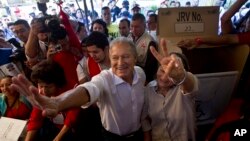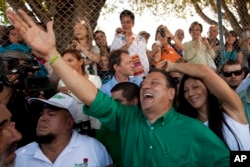Voters are casting ballots in presidential elections in two Central American countries Sunday.
In El Salvavor, former left-wing guerrilla commander Salvador Sanchez Ceren took a strong early lead Sunday, over a conservative rival who wants to send the army in to fight powerful street gangs, but could face a run-off, early results showed.
Sanchez Ceren, a rebel commander who became a top leader of the now-ruling leftist Farabundo Marti National Liberation Front (FMLN) during El Salvador's civil war, had 49.23 percent of the vote with about 12 percent of polling booths counted.
Right-leaning former San Salvador mayor Norman Quijano had 38.74 percent. If there is no clear winner with more than 50 percent of the vote, the two leading candidates will go to a run-off on March 9.
In Costa Rica, the front-runner from the centrist ruling party Johnny Araya tried to fend off a surge by his leftist rival fueled by public anger over corruption scandals and rising inequality. However, given a crowded field, the vote was widely expected to head to an April run-off.
Governing National Liberation Party hopeful Araya led polls on his promise to reduce poverty, and sought to distance himself from President Laura Chinchilla's scandal-plagued government while painting rivals as radicals. Araya on Sunday proclaimed his candidacy "the safest, most responsible option'' for Central America's second-largest economy. But voter anger over government corruption has buoyed a challenge from left-wing lawmaker Jose Maria Villalta, who also promised to tackle inequality in the coffee-producing nation.
If none of the 13 candidates wins more than 40 percent of votes, there will be a run-off between the top two candidates for only the second time in Costa Rican history.
Some information for this report provided by Reuters
In El Salvavor, former left-wing guerrilla commander Salvador Sanchez Ceren took a strong early lead Sunday, over a conservative rival who wants to send the army in to fight powerful street gangs, but could face a run-off, early results showed.
Sanchez Ceren, a rebel commander who became a top leader of the now-ruling leftist Farabundo Marti National Liberation Front (FMLN) during El Salvador's civil war, had 49.23 percent of the vote with about 12 percent of polling booths counted.
Right-leaning former San Salvador mayor Norman Quijano had 38.74 percent. If there is no clear winner with more than 50 percent of the vote, the two leading candidates will go to a run-off on March 9.
In Costa Rica, the front-runner from the centrist ruling party Johnny Araya tried to fend off a surge by his leftist rival fueled by public anger over corruption scandals and rising inequality. However, given a crowded field, the vote was widely expected to head to an April run-off.
Governing National Liberation Party hopeful Araya led polls on his promise to reduce poverty, and sought to distance himself from President Laura Chinchilla's scandal-plagued government while painting rivals as radicals. Araya on Sunday proclaimed his candidacy "the safest, most responsible option'' for Central America's second-largest economy. But voter anger over government corruption has buoyed a challenge from left-wing lawmaker Jose Maria Villalta, who also promised to tackle inequality in the coffee-producing nation.
If none of the 13 candidates wins more than 40 percent of votes, there will be a run-off between the top two candidates for only the second time in Costa Rican history.
Some information for this report provided by Reuters









